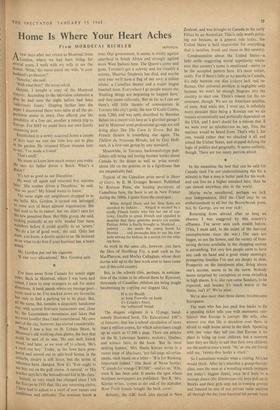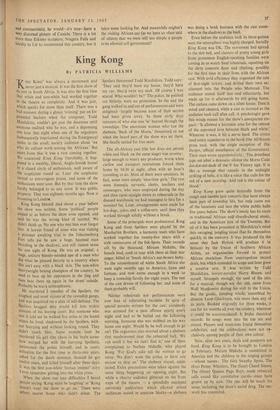Home Is Where Your Heart Aches
From MORDECAI RICHLER MONTREAL AFEW days after our return to Montreal from London, where we had been living for several years, I vvelit with my wife to see the doctor. 'What,' the nurse asked my wife, 'is your husband's profession?'
'Novelist,' she said.
'With what firm?' the nurse asked.
Outside. I bought a copy of the Montreal Gazette. According to the television columnist a Play he had seen the night before had been ludicrously funny.' Dipping farther into the Paper I discovered there were sales at all the de- partment stores in town. One offered you the Possibility of a free car, another a return trip to Europe. For $685 we could have our own family swimming pool.
Established in a newly acquired home a couple of days later we sent our little boy out to play In the garden. He returned fifteen minutes later to say, 'I've made a friend.'
'That's swell.'
'He wants to know how much money you make. He says his father drives a Buick. What's a Buick?'
'It's not as good as our Dauphine.'
He went off again and returned five minutes later. 'His mother drives a Dauphine.' he said. Are We poor? My friend wants to know.' rhe same night our neighbours dropped in to say hello. Mrs. Gordon, it turned out, belonged to some sort of heart ailment organisation. She had used to be in cancer, but she didn't care for the new president there. Her little group, she said, looking pointedly at my wife, needed four more !riembers before it could qualify as an 'artery.' We do a lot of good work,' she said. 'Only last Week, you know, a doctor spoke to us. He lectured us on what to do first if your husband has a heart attack.'
Sir. Gordon put out his cigarette.
It was very educational.' Mrs. Gordon said.
I've been away from Canada for nearly eight Years. Back in Montreal, where I was born and raised, I have to stop strangers to ask for street directions. A bank stands where my teenage pool- room used to be. I've tracked down my favourite bar only to find a parking lot in its place. But, all the same, this remains a singularly handsome City, with several first-rate restaurants and, close by, the Laurentians—mountains and lakes that are even lovelier than I had remembered. My own Part of the city, however, has altered considerably. When I was a boy on St. Urbain Street. in Montreal's old working-class ghetto, the best that could be said of us was, 'He eats well, knock Wood,' and later, as we went off to school, 'He's a rank-one boy.' Today, as the Jews have pros- pered and moved out to split-level homes in the suburbs, rivalry is still fierce, but the terms of reference have changed. Now it's 'You ought to see him out on the golf course. A natural,' or 'His teacher says he's the best-adjusted kid in his class.' Indeed, so very much has changed since I left for Europe in 1953 that, like any returning native, I have had to adjust to a swirl of new names and conditions and attitudes. The uranium boom is
over. Our government, it seems, is mildly against apartheid in South Africa and strongly against more West Indians here. The Queen's come and gone, Toronto's got a subway and the country a seaway, Maurice Ditplessis has died, and maybe next year we'll have a flag of our own, a milder winter, a Canadian theatre and a major league baseball team. Everywhere I go people assure me, 'Exciting things are beginning to happen here,' and they mean culturally. But as far as I can see there's still little theatre of consequence in Toronto (the city's pride, the new O'Keefe Centre, seats 3,200, and was aptly described by Brendan Behan on a recent visit here as 'a glorified garage') and in Montreal semi-professional groups are still doing plays like The Corn Is Green. But the French theatre is something else again. The Maitre du Nouveau Monde, led by Guy Hoff- man, is a first-rate group by any standard.
Meanwhile, in Toronto, backwoods-type pub- lishers still bring out boring booster books about Canada by the dozen as well as 'prize novels' about life on the prairies or in a lighthouse that are unspeakably bad.
Typical of the Canadian prize novel is Short of Glory, by E. M. Granger Bennett. Published by Ryerson Press, the leading purveyors of Canadiana here, the book is set in New France during the 1690s. I quote from the catalogue : When Abigail Davis and her little Susie arc snatched by Indians ... Abigail is rescued by a kindly French family who buy her out of cap- tivity. Unable to speak French and appalled to discover that these generous people are papists, Puritan Abbie is finally brought to Montreal [where] . . . she meets the young baron La Hontan . . and persuades him to use his con- tacts among the Indians in a search for the miss- ing Susie.
At work in the same city, however, you have the likes of Northrop Fry, a poet such as Jay MacPherson, and Morley Callaghan, whose short stories add up to the best work ever to have come out of this cold country.
But, in the schools (this, perhaps, in anticipa- tion of the riches to be offered them by Ryerson), thousands of Canadian children are being taught handwriting by copying out slogans like, H is for Health so keep Face-elk on hand.
it's Canada's finest, the 'softcrised' brand.
The slogans originate in a 32-page, hand- somely illustrated book, The Educational ABC's of Industry, that has a school circulation of more than a million copies, for which advertisers cough up as much as $7,800 a page. There are articles on the St. Lawrence Seaway, rocketry, Quebec, and science fairs, in the book. 'But its most striking feature,' Mrs. Sheila Kieran wrote in a recent issue of Madeans, 'are full-page advertise- ments, each based on a letter—"B is for Banking. Important indeed." (the Bank of Nova Scotia); "C stands for orange CRUSH"—and so on.' Why, even X has been sold. It marks the spot where Southam newspapers are published. 'But R,' Mrs. Kieran writes, 'comes at the end of the alphabet. Rose Food brands bought the back cover.'
Actually, the ABC book idea started in New Zealand, and was brought to Canada in the early Fifties by an Australian. This is only worth point- ing out because, as a general rule today, the United States is held responsible for everything that is tasteless, brash and mean in this country.
Condescension about the United States—a little smile suggesting moral superiority when- ever that country's name is mentioned—seems to be the accepted pattern here. It's most unfair, really. For if there's little or no payola in Canada, it's only because our disc jcckeys lack real in- fluence. Our coloured problem is negligible only because we won't let enough Negroes into the country to start one. There's reason for the re- sentment, though. We are an American satellite, of sorts. And while this, I must say, is infinitely more pleasant than being a Russian one we do remain economically and politically dependent on the USA, and I don't doubt for a minute that if we were ever so mischievous as, say, Tito, the marines would be heard from. That's why I. for one, would rather that we chucked it all and joined the United States, and stopped defying the logic of politics and geography. It seems unlikely, though. There are too many patriots about.
In the meantime the best that can be said for Canada (and I'm not underestimating this for a minute) is that a man is better paid for his work, and can live on a higher standard here, than he can almost anywhere else in the world.
Maybe we're uncultured, perhaps we lack true independence, Dief the Chief may be an embarrassment to all but the Beaverbrook press, but, by George, are we ever rich!
Returning from abroad after so long an absence I was staggered by this country's affluence. I've never seen such wealth before. (This, I must add, in the midst of the heaviest unemployment since the war.) The cars are bigger, so are the homes, and the variety of time- saving devices available in the shopping centres is astonishing. Yet very few people seem to have any cash on hand and a great many seemingly prosperous families I've met are deeply in debt. Prosperity on the instalment plan, living above one's income, seems to be the norm. Nobody seems surprised by corruption or even swindling in high places. It is, like rain some Sundays, to be expected, and besides it's much worse in the States, isn't it? We're nicer.
We're also nicer than those damn, troublesome Europeans.
The man who has just paid five bucks to fix a speeding ticket tells you with enormous con- fidence that Europe is corrupt. His wife, who assures you that life is decadent over there, is afraid to walk home alone in the dark. Speaking
with one voice they tell you that Europe is no place to bring up your children, but a moment later they are likely to add that their own children see the analyst once a week. 'At,' as one old friend told me, 'twenty-five bucks a crack.'
So I sometimes wonder what a visiting African would think. After he's attended a group-therapy class, seen the men at a wrestling match (midgets are today's biggest draw), once he'd been to a teenage dance (the fifteen-year-old boys pull up in Buicks and their girls step out in evening gowns) and listened to one of our private radio stations all through the day (one hundred hit parade tunes
and commercials), he would—it's true—have a very distorted picture of Canada. There is a lot more than Eskimo sculpture. Niagara Falls and loYalty to Liz to recommend this country, but it takes some looking for. And meanwhile mightn't the visiting African say (as we have so often said of others) that we were still too simple a people to be allowed self-government?



































 Previous page
Previous page